- Home
- Theodore Taylor
Timothy of the Cay Page 10
Timothy of the Cay Read online
Page 10
The next six days were the longest in my life. I kept hoping I'd see light of some kind, even dim light, but that darkness I'd lived in since April showed no signs of lifting.
Each day the doctor would come in and make his test with the tiny flashlight, and each time my answer was the same. He wasn't much comfort. He remained gruff and once said, "I don't try to win friends around here. I said I didn't guarantee you'd see again. Let nature work."
I cried several times after he left, giving up hope.
My parents came twice a day to read to me and tell me what they'd been doing outside. They tried to keep my spirits up but we ran out of things to talk about. Although Dr. Pohl had said it might take two weeks to notice any results, I kept thinking the operation had failed. I wouldn't go through it again.
22. Jennifer
AUGUST 1928—Timothy had returned to St. Thomas from Porto Rico aboard the Hannah Gumbs with a cargo of freight, six grunting breeder hogs, and five passengers, and he was unloading at the King's Wharf when Mrs. Josiah Redd walked up to him and said, "De coptin done bus's rope..." Her husband had died.
The frail gray-haired woman in a wide white hat stood on the wharf midships of the Hannah Gumbs, her face sad and grave.
"Ah'm sorry to hear dat. Josiah was a good mahn," Timothy said, his own face suddenly sad and grave. They'd been friends for years, had helped each other obtain cargo and passengers.
"'E balmed in Anteega. De Hettie Redd still downg dere," she said. Her husband was embalmed in Antigua and his schooner was still there. "Ah'd 'predate veree much yuh fetch 'em home."
Timothy did not hesitate in saying yes.
Antigua, a British possession, was some three hundred miles southeast, in the Leeward Islands, near Barbuda and St. Kitts. Timothy had sailed the Hannah Gumbs down there many times. Now he would have to lay her up for a few weeks and lose some income. But his long friendship with Captain Josiah required him to help Mrs. Redd. She smiled briefly, nodded, and moved off into the dockside traffic of horse carts and stevedore's handcarts.
He watched her go, wondering why he'd never taken a wife of his own. His hair was now as gray as hers. He thought he was in his late fifties, too late for marriage and children. He often wondered who would mourn for him when the flame in his own lamp flickered out.
The following Tuesday he boarded the Furness Withy Line ship Cardiff for the day-and-a-half voyage to Antigua. He hadn't sailed on a steamship since the Bartolina.
***
There were no docks at St. Johns, Antigua, and schooners had to anchor in the sheltered waters, as did steamships. Barges with great sweep oars took the cargoes between the anchorages and the warehouses.
Timothy spotted the Hettie Redd not long after the Cardiff passed through the narrow neck and entered the harbor. She was sturdy, a good vessel in a stormy seaway, Josiah had said.
As soon as immigration and customs cleared the Cardiff, Timothy went ashore and headed directly to the funeral home. Though the man in the wooden box was an old friend, Timothy had to steel himself against certain misgivings about the voyage. It was bad luck to transport the dead on a wind-powered ship, he'd always heard. The spirits of the ocean breeze would become angry if they discovered what was in the box.
The papers were signed. Keeping his eyes away from the casket on the donkey cart, he walked beside it to the lightering wharf. The donkey threaded through a herd of goats in the jasmine-scented air. Smoke rose from the hills beyond the harbor as wood was burned to make charcoal.
After the box was off-loaded he made arrangements to take Josiah out to his beloved Hettie Redd, telling the boy who owned the rowboat to wait awhile. Then he walked to the corner of Market and St. Mary's, to the offices of Mohan Singh, shipping agents, to see if they had any cargo or passengers to be forwarded to St. Thomas.
"The cargo is aboard and you'll have four passengers," said one of the Singh sons, a handsome East Indian. "When will you sail?"
"Sooner de bettah," Timothy replied. The hurricane season had begun in July, though none had swept up the Antilles as yet. But the stillness of the early September air made him uneasy. Flags hung limp. Palm fronds were silent.
"Tomorrow morning?" Shri Singh asked.
Timothy nodded.
"I'll see to it that your passengers are on board by eight o'clock."
Timothy nodded again. "Anyting 'bout de wedder?"
Ships sometimes sent messages by cable or radio to report tropical disturbances. Shri shook his head and smiled. "But it is hot, isn't it?"
Timothy agreed. Very hot.
As he left Mohan Singh he had an ominous feeling. The face of the sea had changed during the night, he thought. The long rollers were smooth as glass.
He signed for the cargo that had already been put in the Redd and returned to the lightering wharf to be rowed out to the schooner with Josiah in his box. The harbor was active this day, and Timothy looked from ship to ship, trying to ignore the casket.
Soon the boat bumped up against the white hull, Timothy shouting to deckhands Alfonso Jarvis and Wilmer Lockett to come and help take Josiah aboard.
Alfonso said, "Yuh be coptin an' take us home?"
Timothy frowned up at the young black sailor. "Why yuh tink Ah'm here?" He knew these boys from Charlotte Amalie. They were all right. Captain Redd wouldn't have allowed fools to work his deck.
The passengers came aboard just before eight in the morning, Alfonso and Wilmer taking their luggage to the cabin space below. There were six bunks down there, but the ventilation was the same as sleeping in a closet. Except in heavy rain, straw mats on deck offered cool breezes and a view of the stars.
The Negro passengers were John Dews and Dr. O. W. Bird, going to visit relatives in the British Virgins. The white passengers were merchant Oliver Rankin and his ten-year-old daughter, Jennifer. All were British subjects.
Rankin said, "We could have gone on a steamer but I wanted my daughter to have a voyage under sail."
Jennifer was a fair-skinned, green-eyed redhead. Timothy said to her, "Bes' yuh stay in de shade."
Dr. Bird advised the girl, "Put some vegetable oil on your face and arms."
"I have a parasol," Jennifer said.
"Dis sun'll roas' right through dat silk," Timothy said.
"Listen to them," her father said.
The Hettie Redd swung around while Alfonso and Wilmer. "walked" the capstan to heave in the anchor. Timothy stood at the helm, eyeing the sails, then moved it a few spokes as Alfonso shouted, "Ankar home...," and the schooner got underway. There was barely enough wind for steerage.
As she passed slowly through the draw, Timothy, unable to shake off the ominous feeling, searched the heavens for cirrus clouds. They were usually the first signs of a hurricane. If a tempest was on its way, they would stretch in bands and gradually thicken to cirrostratus, rising to great heights.
Timothy knew the cirrus as "cat's tails," slender, wavy parallel lines penciled in white on the blue sky. When the fine threads of the cirrus appeared to be blown or brushed backward at one end, toward the roof of the sky, the wind would sooner or later veer around to that point. He'd seen it happen.
The course was west-by-north, skirting the islands of Nevis, St. Kitts, Sint Eustatius, and Saba, finally angling by Virgin Gorda and on into St. Thomas.
By midafternoon, the breeze was as dead as Captain Josiah. The schooner drifted helplessly about fifteen miles off Antigua, her sails not even flapping. The long swells were as slick as the silk on Jennifer's parasol. The heat bore down on the Hettie Redd. Timothy sat on a fruit box by the helm and studied the barometer, which measured air pressure. It was abnormally high.
He was uneasy.
At sundown, there was a threatening, flaming red border across the west horizon, and through the thin veils of cirrus clouds, a solar halo could be seen. Timothy studied it while the Hettie Redd drifted.
Alfonso, the oldest deckhand, asked, "We gonna git de tempis?" He asked it quietly so the passeng
ers couldn't hear.
Timothy nodded.
The Cardiff scurried by them, smoking furiously from her stack. "Runnin' from de starm," Timothy observed. Her captain didn't want to be caught in port and wrecked on shore. Maybe he'd received a radio warning.
"Isn't it a lovely sunset?" said Jennifer, who'd come aft to stand beside Timothy.
Turning to look at her, he replied, slowly, "Ah bes' 'ave it clear."
"You've been going to sea a long while?" she said.
"Mos' o' my life. More dan forty years..."
"I think I'd like to become a sailor and sail all the seas. Such adventure. But girls aren't allowed to be sailors. I say, why not, Captain Timothy?"
He examined her. Her skin was like those jars they called porcelain. She was so serious. If he was a bukra and had a daughter, he'd like her to be a Jennifer Rankin. He laughed softly. "'Tis a 'ard life out 'ere. Dere days when de sea is calm an' pretty. Den days when she go wil' an' de waves turn white, high as dat mas'. Dose days 'tis no place foh mahn or womahn..."
***
The horizon flamed again for a few minutes at dawn. As the bowl of the sky lightened, Timothy, who had only dozed during the hot, still night, staying by the helm, saw that the cat's tail clouds, now stretching in bands across the sky, had begun to thicken and rise.
The barometer started to fall and a light easterly breeze rippled the long, oily swells that rolled as far as the eye could see. He estimated that the Hettie Redd had now drifted about twenty-five miles west and north of Antigua. If the hurricane gave him time he'd run west and duck into the lee of St. Kitts, knowing that its mountain towered up almost four thousand feet, providing some shelter from the wild wind.
Midmorning, when an arc of dense, dark clouds began to form at the point where the clouds converged, Oliver Rankin worriedly approached Timothy. "Are we in for a storm?"
"Yes, sirrah, Ah tink we are."
"Can't we return to Antigua?"
"Ah don't tink we 'ave de time. De win' be blowin' us west."
"You're responsible for our lives and safety, Captain," Rankin reminded him.
"Ah'll do all I can, sirrah," Timothy replied. He now realized he might have made a mistake leaving Antigua. While the Hettie Redd would risk being wrecked in the harbor, his passengers would have a chance at getting ashore safely. In open sea, their chances were considerably less.
Shortly before eleven, the barometer fell again and light rain sprinkled the ocean. The sun vanished and the air turned cool. At first, the rising wind was light, filling the sails, and Timothy set a course due west as bluish black clouds swelled and spread. He ordered Alfonso and Wilmer to batten down the hatches and secure the deck.
For a moment, now that the Hettie Redd was moving again, he considered trying to reach Antigua, but he'd have to tack back and forth to do it. There wouldn't be enough time. He was committed to running before the storm.
Soon the barometer dropped as if it had no bottom and the black clouds began to race above the schooner. The rain became torrential. Timothy shouted, "Ebrybodee put on de life jackets!" Alfonso had brought them up from below and had rigged lifelines near the helm. He ordered the passengers to hang on to the lengths of rope.
The sails were dropped and secured. The Hettie Redd would run before the wind on bare masts. It was already blowing thirty or forty miles an hour, enough to send the hull forward without the canvas wings.
Just before noon, the edge of the hurricane finally caught the Hettie Redd. The wind shrieked, and mountainous waves, surging from the stern, drove the hull as if it were a tiny sliver of bark, sending it up walls of white-veined water. Then it staggered down into valleys, burying the bow, the sea washing waist deep back over the deck.
Timothy clung to the helm, trying to keep the schooner bow first in the waves. He glanced at the huddled, drenched passengers and crew. They were holding desperately to the lifelines.
He couldn't see Dr. Bird. He shouted to Alfonso.
"Ovahboard," Alfonso shouted back.
Rankin's face was flour white. He was gripping the lifeline with one hand, holding Jennifer with the other.
For almost two hours, the Redd survived the giant gray seas that were towering over her stern, then lifting her with a mighty thrust to drop her into another huge hollow. Timothy had never seen such rage in the sea. As he watched helplessly, John Dews let go the lifeline, and though Wilmer tried to grab him as his body hung on the after rail for a few seconds, he tumbled into the water.
Finally, the Hettie Redd surrendered. A monster wave, racing down on her before she could struggle up from the last one, twisted the hull sideways and she turned turtle, masts pointing toward the bottom for a few seconds.
Her rigging entangled Timothy, Alfonso, Wilmer, and Oliver Rankin. Jennifer disappeared.
Timothy broke loose and fought back to the surface, seeing Jennifer floating nearby in her cork life jacket. He used all his strength to swim to her and wrap his arm around her. She was unconscious. He found the stub of a boom and hooked one arm over it, holding her with the other. They rode the huge seas.
Finally, she came to but did not speak. She just looked at him with those green eyes. They seemed to be asking, Why did it happen to us? To me? Her sodden red hair framed her face.
He shouted, "Hang on, hang on!..."
A few minutes later, the wooden box containing Captain Josiah Redd skidded down the hill of a wave near them. Timothy ducked from it, turning away. The spirits of the ocean breeze had gotten what they wanted.
For the next two hours, Timothy and Jennifer struggled in the ocean mountains, streaked with white spindrift; gasping in the hollows, rising to the crests where the wild wind tore off wave tops and made blinding, salty arrows out of them. Timothy knew Jennifer was swallowing water, and he could feel the strength leaving her. She'd closed her eyes, giving up. He shouted to her, again and again, "We'll lib, we'll lib!..." But there was no response.
The roaring wind slowed; then it ceased. Quiet descended and the clouds parted. The sun shone down brightly on the still-heaving, foam-licked gray seas. They were floating in the eye of the hurricane, and Timothy kept saying encouraging words to Jennifer even though he knew she was dead from exhaustion and terror. He also knew that the full fury of the storm, coming from the opposite direction, would likely start again within an hour. But he refused to give up the slight body he was holding.
A day later, Timothy, still holding Jennifer Rankin, washed ashore on the island of Nevis; he was the only survivor of the schooner Hettie Redd. Jennifer stared lifelessly at him as he dragged her up onto the beach. He knew he'd forever be haunted by that pretty face and those warm green eyes. He alone had made the decision, as captain, to leave the comparative safety of St. Johns Harbor. There were dark times ahead, day and night, when he would wish he'd drowned with Jennifer.
23. Trees
On the ninth day after surgery, just before noon, something strange occurred. I was alone in the room and suddenly saw clouds and trees, very distinctly. I screamed, "I can see, I can see!" and buzzed the nurse to tell her to call Dr. Pohl.
When she came into the room, I said, "I can see trees and clouds..."
"Where?"
"Right out there," I said, pointing.
"But you're not even looking out the window."
"I can see them," I insisted.
"The sky is blue, not a cloud in it, and we're too high up for you to see treetops..."
I couldn't believe her. "Is there something in the room that looks like clouds and trees? A painting, maybe?"
"Nothing on these walls. They're green. There's not a thing on them," she said.
"I tell you, I can see them."
"Okay. I'll put it on your chart. Dr. Pohl is in surgery," the nurse said.
In a few minutes, the clouds and trees disappeared and I broke into tears.
When my parents came in, after lunch, I asked them to look out the window and see if there were clouds and trees out there. "Fluff
y white clouds and green trees," I said. "I saw them."
They were slow to answer. "Well, that's wonderful, Phillip," my father said. The tone of his voice said he felt something else: alarm.
Mother said, "You told the nurse?"
"She didn't believe me."
"Well, those are nice things to see," said my mother. Her tone said she might agree with the nurse. That the operation had affected my mind.
I got angry. "I did see them!"
"Do you see them now?" my father asked.
"No!" I shouted.
They stayed until late afternoon. We walked along the hallways for a while. I'd been on my feet for more than a week, went to the johnny by myself, even took showers by myself. This was my father's last visit. He was flying back to Curaçao that night on Pan Am. He kissed me and hugged me, saying he knew I'd have my sight back soon. But his voice was hollow.
About an hour later, I heard Dr. Pohl's voice in the hallway, then he came in. "What's going on in here? Miss Evans told me you were seeing things..."
I said I had seen things. "Nobody believes me, but I saw trees and clouds today."
He laughed, which surprised me. "Right on schedule. Didn't I tell you about Anton's Syndrome?"
"No."
"Harmless hallucinations. You know what a hallucination is?"
"Not really."
"It's a sensory experience of something that does not exist outside the mind."
"I was seeing something that wasn't there?" I could feel my world crumbling, my hopes gone.
"Don't look so confounded miserable! This means you're healing. Happens to people who've had their occipital lobes disturbed. That nerve is used to seeing things. If you've got a blanked-out area the brain will substitute. You'll be seeing a lot of things. Enjoy the scenery. You might see family, friends. Your house down on that island. And when people tell you they can't see what you see, just say, 'Too bad.'"
Over the next three or four days, I "saw" many images of the past. The Schottegat, with sailboats on it; Mount Sint Christoffelberg, the highest in Curaçao; the swinging pontoon bridge at the harbor entrance; my father; Stew Cat; even Henrik van Boven.

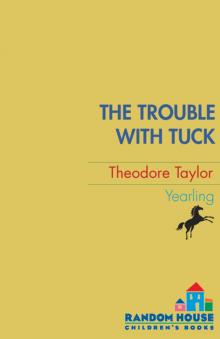 The Trouble With Tuck the Trouble With Tuck
The Trouble With Tuck the Trouble With Tuck The Bomb
The Bomb Teetoncey and Ben O'Neal
Teetoncey and Ben O'Neal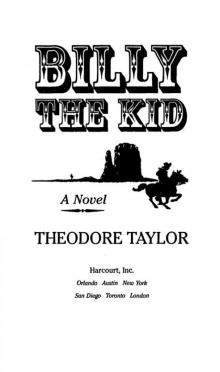 Billy the Kid
Billy the Kid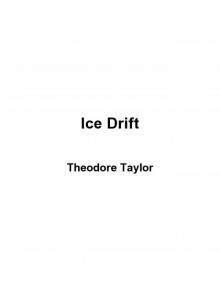 Ice Drift
Ice Drift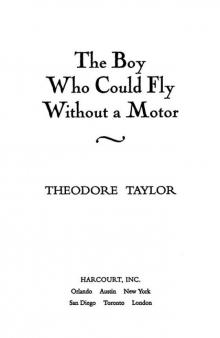 The Boy Who Could Fly Without a Motor
The Boy Who Could Fly Without a Motor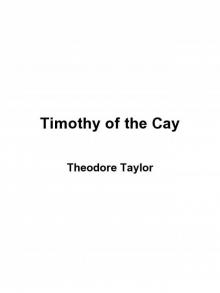 Timothy of the Cay
Timothy of the Cay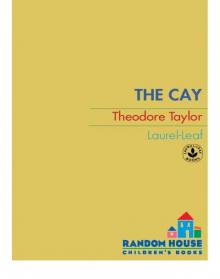 The Cay
The Cay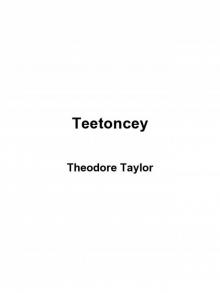 Teetoncey
Teetoncey Into the Wind: The Odyssey of Ben O'Neal
Into the Wind: The Odyssey of Ben O'Neal The Odyssey of Ben O'Neal
The Odyssey of Ben O'Neal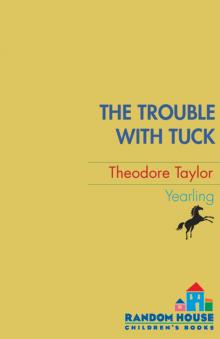 The Trouble with Tuck
The Trouble with Tuck